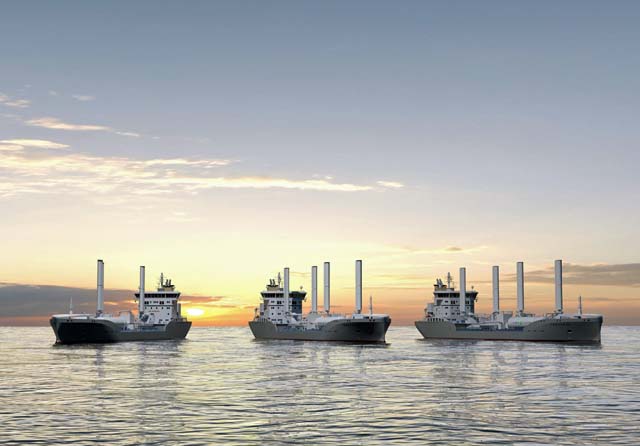Kongsberg Maritime (KM) has been contracted to provide design, engineering and equipment for three MGO/biofuel and methanol-ready 15,000 dwt tanker ships being built for Danish tanker operator Tärntank, which will feature wind assist technology plus Tärntank’s own battery-powered hybrid solution.
The new ships will be built at China Merchants Jinling Shipyard, Yangzhou for delivery scheduled in 2025. The company believes that the project stands out for incorporating so many energy-saving and clean technologies in one vessel.
As part of a contract valued at NOK 120m (c €10.5m), Kongsberg will supply steering gear, rudders, controllable pitch propellers, tunnel thrusters and thruster control systems, integrated automation systems including Vessel Insight, propulsion control systems and deck machinery. This is in addition to design and engineering services.
Rune Ekornesvåg, KM Sales Director Ship Design said: “This contract marks Kongsberg Maritime as a front runner in designing low emission and sustainable solutions for the shipping industry.”
The new vessels will reduce CO2 emissions using methanol-fuelled engines, wind-assisted propulsion, hybrid battery systems, and on-shore power. The wind-assist technology is expected to reduce emissions by up to 19%, in addition to the 40% reduction achieved on Tärntank’s six previous vessels. The new vessels are to have an Energy Efficiency Design Index close to 40% below the 2025 Phase 3 requirements.
Claes Möller, CEO Tärntank Ship Management said: “With these methanol and wind assistance-ready vessels, we take a big step forward in our journey as the forerunner in environmentally efficient and safe shipping.”
Tärntank considers wind assist propulsion to be one of the most promising measures to reducing fuel consumption in the shipping industry. KM’s cooperation with Tärntank began in 2013, when Kongsberg designed four LNG-powered chemical tanker vessels for the company. These were followed by a contract for two more vessels in 2019. Tärntank operates in the North Sea and Baltic Sea, with 10 ice-strengthened vessels.



